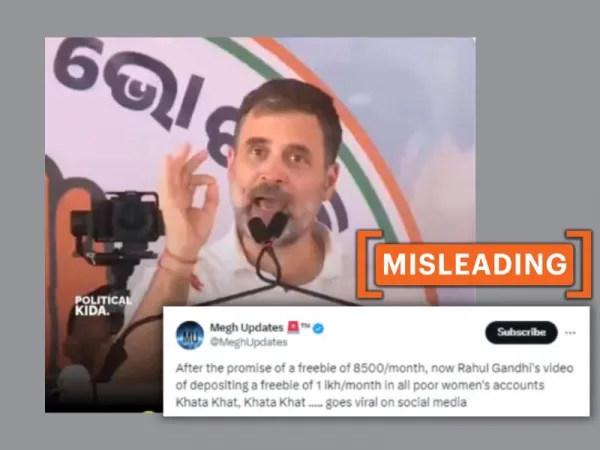By: Rahul Adhikari
May 16 2024
 Social media posts claim that Rahul Gandhi promised Rs 1 lakh per month to India’s poor. (Source: X/Modified by Logically Facts)
Social media posts claim that Rahul Gandhi promised Rs 1 lakh per month to India’s poor. (Source: X/Modified by Logically Facts)
The longer video shows the Congress leader explaining how the economically weaker women in India will receive a monthly installment of Rs 8,500.
What is the claim?
A video of Congress leader Rahul Gandhi addressing a rally has been shared online claiming that he promised to deposit one lakh rupees per month in the bank accounts of economically weaker women in India. In the 19-second-long viral video, Gandhi says, “One lakh rupees will be transferred to India’s poor women’s bank accounts every month.”
Several users have shared the video on X (formerly Twitter). One user wrote, “The majority of middle-class families in India earn below ₹12 lakh per annum. Rahul Gandhi wants them to vote for him so that, after taxing them heavily, he can pay ₹12 lakh per annum to the unemployed.” Archived versions of such posts can be found here, here, here and here.
Screenshots of the viral posts. (Source: X/Modified by Logically Facts)
However, the claim is misleading. A longer version of the video shows Gandhi explaining the arithemetic and saying that a total of Rs one lakh will be deposited in the bank accounts of economically weaker women.
How did we find the truth?
We found that the viral clip has been taken from a Congress rally held in the East Indian state of Odisha's Bolangir on May 15. Gandhi's address was livestreamed on the Indian National Congress (INC) YouTube channel (archive here).
In this video, he said that after the Congress forms the government on June 4, the date of declaration of election results, women from economically weaker sections in India will receive Rs 8,500 per month in her bank account, totaling a lakh in a year.
At 29:15-minute mark of the over 39-minute-long video, taking an example of a woman present in the rally, Sushmita Sahu, Gandhi said, “On July 4, crores of women like Sushmita Sahu in Odisha, UP, Tamil Nadu, and every state in India, will wake up and check their bank accounts (2). On July 4 they will find one month’s installment of Rs 8,500 rupees deposited in their bank accounts."
Explaining the arithmetic, he said the same money would be transferred every month, and in a year, one lakh would be given to women like Sahu. “One lakh rupees will be transferred to India’s poor women’s bank accounts every month,” added Gandhi, making sounds to mimic the nature in which these transfers would be done. “This is called progress,” he further said.
The segment between the 30:38-minute to 30:50-minute timeframe, where Gandhi said, “one lakh rupees will be transferred to India’s poor women’s bank accounts every month,” was shared to make the false claim.
Even as a part of their manifesto for the 2024 Lok Sabha polls, Congress has promised that they will transfer Rs one lakh every year to "every poor Indian family" under the Mahalakshmi scheme, ideally to the bank account of the oldest woman of the household. In his speech in Bolangir, Gandhi was reiterating their promise, not making new ones of transferring rupees one lakh to poor women’s accounts every month.
Screenshot of the Congress election manifesto. (Source: Indian National Congress/Screenshot)
The verdict
A video of Rahul Gandhi’s speech has been circulated, claiming that he said that every poor women in India will get one lakh rupees per month. But a longer version of the video shows him explaining how the transfer will be done over a period of 12 months.